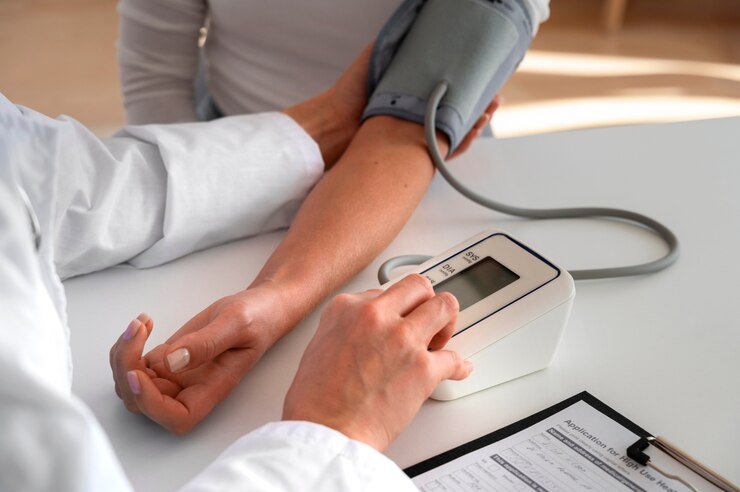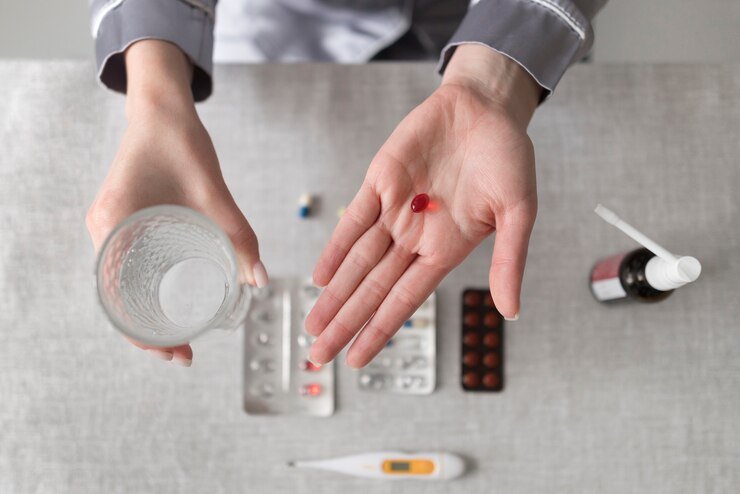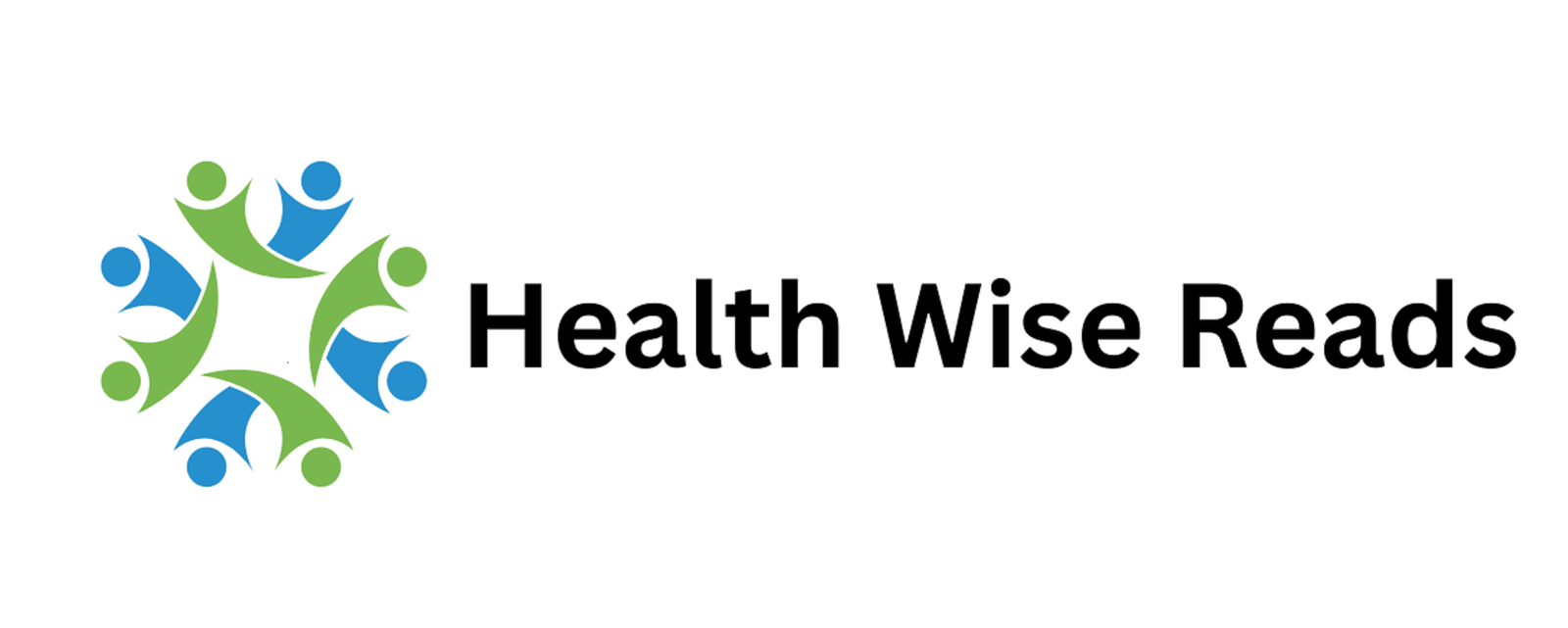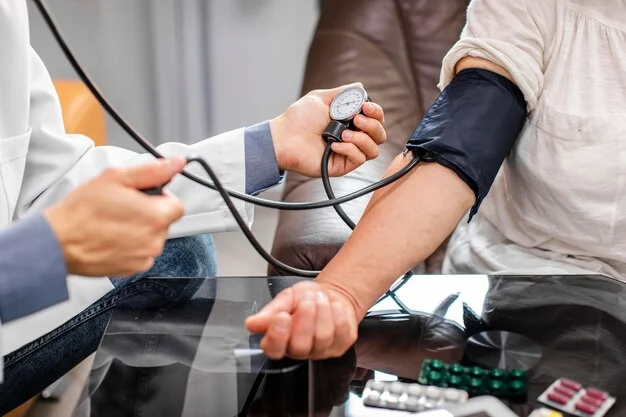How Long Does Blood Pressure Medicine Take to Work
Introduction
High blood pressure, Commonly referred to as hypertension, this health issue affects millions of people globally. It’s often called the “silent killer” due to its ability to cause significant health issues without noticeable symptoms. Managing high blood pressure is crucial for preventing heart disease, stroke, and other conditions. Among the various strategies to control hypertension, blood pressure medication plays a vital role. This blog aims to explore how long blood pressure medicine takes to work, its effectiveness, potential side effects, and complementary natural remedies. By understanding these aspects, individuals can better navigate their treatment options and work towards achieving and maintaining normal blood pressure levels.

Understanding Blood Pressure and Its Impact
Blood pressure refers to the force that blood circulating in the blood vessels exerts on their walls. It is one of the critical indicators of heart health, measured in millimeters of mercury (mm Hg) and recorded as two numbers: systolic and diastolic. The systolic pressure represents the force when the heart beats, and the diastolic pressure shows the force when the heart is at rest between beats. The normal range of blood pressure is usually around 120/80 mm Hg.
The Importance of Maintaining Normal Blood Pressure
Maintaining normal blood pressure is essential for health because high blood pressure can strain the heart, arteries, and kidneys, leading to serious health issues. Hypertension increases the risk of heart disease, stroke, kidney failure, and other conditions by damaging blood vessels over time. The challenge with high blood pressure is that it can be silently causing damage for years without obvious symptoms, making regular monitoring crucial.

Health Risks Associated with High Blood Pressure
- Heart Disease and Stroke: High blood pressure can lead to hardened arteries, reducing blood and oxygen flow to the heart, culminating in heart disease or heart attacks. It’s also a leading cause of stroke due to its potential to cause blood vessels in the brain to burst or be blocked by clots.
- Kidney Damage: The kidneys use a delicate system of blood vessels to filter waste from your blood. High blood pressure can damage this filtering system, leading to kidney failure.
- Vision Loss: The eyes, like the kidneys, are supplied by small blood vessels. Hypertension can damage these vessels, leading to vision problems or blindness.
- Sexual Dysfunction: This is a less talked about but significant impact of high blood pressure, affecting both men’s and women’s sexual health.
Given these risks, it’s clear why managing blood pressure is a priority for those diagnosed with hypertension. Medication, along with lifestyle changes, plays a crucial role in controlling blood pressure levels and mitigating these risks. The next section will delve into the various types of blood pressure medications, their mechanisms of action, and their role in a comprehensive blood pressure management plan.
How Blood Pressure Medications Work
Blood pressure medications are designed to lower high blood pressure to a healthier level, thereby reducing the risk of heart disease, stroke, and other health problems. There are several classes of blood pressure medications, each working through a different mechanism to lower blood pressure. Understanding these mechanisms can help individuals comprehend how these medications contribute to the management of hypertension.
Types of Blood Pressure Medications and Their Functions
- ACE Inhibitors (Angiotensin-Converting Enzyme Inhibitors): These drugs help relax blood vessels by preventing the formation of a natural chemical that narrows blood vessels. Examples include lisinopril and enalapril.
- Angiotensin II Receptor Blockers (ARBs): Similar to ACE inhibitors, ARBs block the action of angiotensin II, a chemical that narrows blood vessels, allowing the vessels to stay wider and lower blood pressure. Losartan and valsartan are common ARBs.
- Beta-Blockers: These medications reduce the workload on the heart and open the blood vessels, causing the heart to beat slower and with less force. Metoprolol and atenolol are examples of beta-blockers.
- Calcium Channel Blockers: These drugs prevent calcium from entering the muscle cells of the heart and blood vessels, allowing the blood vessels to relax. Amlodipine and diltiazem are examples.
- Diuretics: Also known as “water pills,” diuretics work by flushing excess salt and water from the body through urine, which helps to lower blood pressure. Hydrochlorothiazide and furosemide are common diuretics.
- Renin Inhibitors: A newer class of medication that directly inhibits renin, an enzyme produced by the kidneys that starts a chain reaction leading to blood vessel narrowing. Aliskiren is an example.

Blood Pressure Medication Effectiveness
The effectiveness of blood pressure medication is measured by how well it can lower a person’s blood pressure to normal levels and reduce the risk of heart disease and stroke. The goal is to bring blood pressure down to less than 130/80 mm Hg for most people, but targets can vary based on individual health conditions and age.
Monitoring and Adjusting Medication
Blood pressure response to medication can vary among individuals. Some may see improvements within a few days, while others may need weeks. Regular monitoring by healthcare providers is crucial to adjust dosages or medications as needed to achieve optimal blood pressure control. This personalized approach ensures that the medication not only works effectively but also minimizes side effects.
Understanding the types of blood pressure medications and how they work is essential for anyone managing hypertension. It’s also important to have open discussions with healthcare providers about which medication or combination thereof might be most effective for individual health needs and lifestyle considerations.
Timeline for Blood Pressure Medication Effectiveness
The timeline for blood pressure medication to take effect can vary significantly depending on the type of medication, the individual’s overall health, the severity of hypertension, and lifestyle factors. Understanding this timeline and the adjustment period is essential for setting realistic expectations and effectively managing blood pressure.
General Timelines for Blood Pressure Medication Effectiveness
- Immediate-acting vs. Long-term Medications: Some blood pressure medications, such as fast-acting nitrates, can work within minutes to hours and are often used for quick relief in situations like hypertensive crises. However, most blood pressure medications are designed for long-term management and may take several weeks to reach their full effect.
- Adjustment Period: The first few weeks after starting a new blood pressure medication are often considered an adjustment period. During this time, healthcare providers monitor blood pressure responses closely and may adjust the dosage or try different medications to achieve the best control with minimal side effects.
- Achieving Target Blood Pressure: For many individuals, reaching the target blood pressure may take a few weeks to a few months after starting medication. Consistency in taking medication, combined with lifestyle changes, plays a crucial role in this process.
Factors Influencing How Quickly Medications Work
- Type of Medication: As mentioned, the class of blood pressure medication can affect how quickly it begins to lower blood pressure. ACE inhibitors, ARBs, and beta-blockers may take longer to show their full effects compared to diuretics or calcium channel blockers.
- Dosage and Combination Therapy: Higher doses or combinations of different classes of blood pressure medications may be more effective in quickly reducing blood pressure but also require careful monitoring for side effects.
- Individual Health Factors: Age, kidney function, and the presence of other medical conditions can influence how quickly and effectively blood pressure medications work.
- Lifestyle Factors: Diet, exercise, and other lifestyle choices can significantly affect how blood pressure responds to medication. For example, a high-salt diet can lessen the effectiveness of certain blood pressure medications.
Can Blood Pressure Medicine Work Immediately?
While some medications can provide rapid effects in acute situations, most blood pressure medications are designed for gradual and sustained control. Immediate changes in blood pressure readings after starting medication are usually not expected. Patience and adherence to the prescribed medication regimen are crucial during the initial weeks of treatment.
Monitoring and Adjusting Blood Pressure Medication
Given the variability in how individuals respond to blood pressure medication, regular monitoring is vital. Home blood pressure monitoring can provide valuable information to healthcare providers, helping them to adjust treatment plans as needed. It’s also essential for individuals to communicate any side effects or concerns during this adjustment period to optimize treatment effectiveness and tolerability.
The Role of the Individual in Managing Blood Pressure
Active participation in managing hypertension, including lifestyle modifications such as a healthy diet, regular exercise, and reducing sodium intake, can enhance the effectiveness of blood pressure medication. In some cases, these changes may even allow for lower doses of medication or reduce the number of medications needed to control blood pressure.
Monitoring Blood Pressure at Home
Regular monitoring of blood pressure at home is a crucial component of managing hypertension effectively. It empowers individuals to actively participate in their care, provides valuable information for healthcare providers to tailor treatment plans, and helps in the early detection of potential issues with blood pressure control.
Importance of Home Blood Pressure Monitoring
- Self-Management: Regularly checking blood pressure at home helps individuals understand how their lifestyle choices and medications affect their blood pressure.
- Medication Adjustment: Home readings can indicate whether blood pressure medication is working as intended or if adjustments are needed.
- Early Detection: Monitoring can help catch sudden increases in blood pressure that may require urgent medical attention.
Best Practices for Monitoring Blood Pressure at Home
- Choose a Reliable Device: Use an automatic, cuff-style, upper-arm monitor that has been validated for accuracy. Finger and wrist monitors are less dependable
- Consistency is Key: Measure blood pressure at the same times each day, typically in the morning before taking medication and in the evening.
- Proper Technique: Ensure you’re seated in a chair with your feet flat on the floor and your arm supported at heart level. Relax for 5 minutes before taking a measurement.
- Record Your Readings: Keep a log of your readings to share with your healthcare provider. Many modern devices can store readings or connect to apps to track trends over time.
Best Time to Take Blood Pressure Medicine
The best time to take blood pressure medication varies depending on the type of medication and individual health needs. Some medications are more effective when taken at night, as they can reduce the risk of heart attack and stroke by addressing nighttime blood pressure spikes. However, the optimal timing should be determined in consultation with a healthcare provider based on the specific medication and the individual’s blood pressure pattern.
Monitoring blood pressure at home is a simple yet powerful tool in managing hypertension. By combining regular monitoring with medication adherence and lifestyle modifications, individuals can significantly improve their blood pressure control.
Side Effects of Blood Pressure Medication
Blood pressure medications, while essential for managing hypertension, can sometimes cause side effects. These effects vary depending on the type of medication, dosage, and individual health conditions. Being aware of possible side effects and knowing how to manage them can help individuals continue their treatment with minimal discomfort.
Common Side Effects of Blood Pressure Medication
- Fatigue and Dizziness: Medications that lower heart rate, such as beta-blockers, can lead to feelings of tiredness and dizziness, especially in the early stages of treatment.
- Cough: ACE inhibitors are known for causing a persistent, dry cough in some individuals.
- Fluid Retention or Edema: Calcium channel blockers may cause swelling in the feet, ankles, and legs due to fluid accumulation.
- Gastrointestinal Distress: Some blood pressure medications can cause nausea, constipation, or diarrhoea.
- Electrolyte Imbalance: Diuretics, while effective in reducing blood pressure, can lead to imbalances in electrolytes, which are vital minerals in your body, like potassium.
Managing Side Effects
- Communication with Healthcare Providers: It’s crucial to discuss any side effects with healthcare providers. They can adjust the dosage, switch to a different medication, or suggest ways to mitigate side effects.
- Gradual Adjustment: For some medications, side effects diminish as the body adjusts. A gradual increase in dosage may be recommended.
- Lifestyle Modifications: Engaging in regular physical activity, maintaining a healthy diet, and managing stress can help alleviate some side effects.
- Medication Timing: Changing the time of day you take medication can sometimes reduce side effects. For instance, taking medication at night may help manage daytime fatigue.
Side Effects of Stopping Blood Pressure Medication Suddenly
Stopping blood pressure medication without consulting a healthcare provider can lead to a dangerous rebound effect, causing blood pressure to spike suddenly. This sudden increase can put individuals at risk for heart attack, stroke, and other serious health issues. If side effects are troublesome, healthcare providers can offer alternative solutions that do not involve abruptly discontinuing medication.
Tips for Taking Blood Pressure Medication
- Adherence: Consistently taking medication as prescribed is vital for managing blood pressure effectively. Setting reminders or using a pill organizer can help.
- Monitoring: Keep track of blood pressure readings and side effects to discuss with healthcare providers during appointments.
- Lifestyle Integration: Incorporate medication into a routine that includes healthy lifestyle choices, such as diet and exercise, to enhance overall effectiveness and well-being.
Managing the side effects of blood pressure medication is a balance between effective blood pressure control and maintaining quality of life. Open communication with healthcare providers and proactive management strategies can make this balance easier to achieve.
Natural Remedies and Lifestyle Changes
In addition to medication, incorporating natural remedies and making lifestyle changes are pivotal strategies in managing hypertension. These methods can not only enhance the effectiveness of blood pressure medication but, in some cases, may lead to a reduced need for medication altogether. Here, we’ll explore some of the best natural alternatives and lifestyle adjustments to support blood pressure management.
Diet: The Foundation of Blood Pressure Management
- DASH Diet: The Dietary Approaches to Stop Hypertension (DASH) diet is highly recommended for people with high blood pressure. It focuses on eating fruits, vegetables, whole grains, lean protein, and low-fat dairy while limiting salt, red meat, sweets, and foods containing high amounts of saturated fat.
- Salt Intake: Reducing salt intake can significantly lower blood pressure. Aim for no more than 2,300 milligrams a day, with an ideal limit of 1,500 milligrams for most adults.
- Potassium-rich foods: Increasing potassium intake can help balance the effects of sodium and reduce blood pressure. Foods like bananas, potatoes, tomatoes, and spinach are good sources of potassium.
Exercise: A Vital Component for Heart Health
Regular physical activity strengthens the heart, allowing it to pump blood with less effort and lowering the pressure on the arteries. Aim for at least 150 minutes of moderate-intensity aerobic exercise, such as walking, cycling, or swimming, per week. Strength training exercises at least two days a week can also be beneficial.
Weight Management
It is important to maintain a healthy weight in order to manage blood pressure. Even a small amount of weight loss can help reduce blood pressure in individuals who are overweight or obese. Typically, a reduction of about 1 mm Hg in blood pressure can be expected for every kilogram (approximately 2.2 pounds) of weight lost.
Stress Management
Chronic stress can lead to high blood pressure. Although it may not be possible to eliminate the sources of stress, developing coping mechanisms can help reduce its effects on blood pressure. Techniques like deep breathing, meditation, yoga, and regular physical activity can be effective in reducing stress.
Limiting Alcohol and Quitting Smoking
- Alcohol: Drinking alcohol in moderation, if at all, can reduce blood pressure. For healthy adults, that means up to one drink a day for women and two drinks a day for men
- Smoking: Smoking a cigarette increases blood pressure temporarily even after finishing. Quitting smoking helps return blood pressure to normal.
Natural Supplements
Certain supplements have been studied for their potential to lower blood pressure, including:
- Garlic Extract: Known for its cardiovascular benefits, garlic extract can have a modest blood pressure-lowering effect.
- Omega-3 Fatty Acids: Found in fish oil and flaxseeds, omega-3s can help lower blood pressure slightly.
- Magnesium: This mineral helps relax blood vessels and can be found in supplements or foods like green leafy vegetables and whole grains.
It’s important to consult with a healthcare provider before starting any supplements, as they can interact with medications and may not be appropriate for everyone.
Lifestyle Integration for Effective Blood Pressure Management
Integrating these natural remedies and lifestyle changes into your daily routine requires a holistic approach. Start with small, manageable changes and gradually build up to a healthier lifestyle. Monitoring your blood pressure at home can help you see the impact of these changes and motivate you to continue.
Choosing the Right Blood Pressure Medication
Selecting the most suitable blood pressure medication is a critical decision that depends on various factors, including individual health conditions, potential side effects, and the specific goals of treatment. This decision is best made through a collaborative process between the patient and their healthcare provider, taking into account the unique aspects of the individual’s health profile and lifestyle.
Factors to Consider When Choosing Blood Pressure Medication
- Underlying Health Conditions: Certain blood pressure medications work better for people with specific conditions. For example, ACE inhibitors are often recommended for patients with diabetes or chronic kidney disease because they help protect the kidneys.
- Age and Race: Research has shown that some blood pressure medications may work better in people of certain age groups and racial backgrounds. For instance, ACE inhibitors and ARBs may be more effective in younger individuals, while older adults and African Americans might respond better to calcium channel blockers or diuretics.
- Potential Side Effects: Different medications come with different side effects. It’s important to discuss these potential side effects with your healthcare provider to choose a medication that you’re comfortable with and that aligns with your lifestyle.
- Cost and Accessibility: The cost of medication and its availability can also influence the choice. Some blood pressure medications are available in generic form, which can be more cost-effective.
Blood Pressure Medication and Weight Loss
Weight management is an important aspect of controlling high blood pressure. Some blood pressure medications can cause weight gain or make it more difficult to lose weight. If weight management is a concern, discuss with your healthcare provider the possibility of choosing medications that have a neutral effect on weight or may even assist in weight loss efforts.
The Impact of Diet on Blood Pressure Medication Effectiveness
Diet can significantly affect the effectiveness of blood pressure medication. A diet high in fruits, vegetables, and whole grains and low in sodium and unhealthy fats can enhance the effectiveness of blood pressure medication. Conversely, a diet high in sodium can reduce the effectiveness of certain medications and make it harder to control blood pressure.
Tips for Taking Blood Pressure Medication
- Adherence: Consistently taking your medication as prescribed is crucial for its effectiveness. Consider using reminders or a medication tracker to help maintain your regimen.
- Lifestyle Modifications: Pairing medication with the recommended lifestyle changes can improve medication effectiveness and overall cardiovascular health.
- Regular Check-Ups: Regularly consult with your healthcare provider to ensure the medication is working as intended and to make any necessary adjustments.
Choosing the right blood pressure medication involves careful consideration and open communication with your healthcare provider. By taking into account your individual health needs, potential side effects, and lifestyle factors, you can find a medication regimen that effectively manages your blood pressure with minimal side effects.
FAQs About Blood Pressure Medication
Can Blood Pressure Medicine Work Immediately?
While some types of blood pressure medication can produce effects within hours, most are designed for long-term management of hypertension and may take several weeks to show their full benefits. Immediate-acting medications are typically reserved for acute situations and not for daily long-term management.
What Are the Signs That Your Blood Pressure Medicine Is Working?
The primary sign that your blood pressure medication is working is a decrease in your blood pressure readings towards your target range. You might also notice a reduction in hypertension-related symptoms, such as headaches, dizziness, or blurred vision, if you experience these symptoms due to high blood pressure.
How Do Different Types of Blood Pressure Medications Affect How Quickly They Work?
Different classes of blood pressure medications work through various mechanisms and thus have different timelines to take effect. Diuretics and calcium channel blockers may show effects more quickly than ACE inhibitors or beta-blockers. Your healthcare provider can provide more detailed information based on the specific medication prescribed.
What to Do if Blood Pressure Medication Does Not Seem to Work?
If your blood pressure medication does not seem to be effective, it’s important to consult with your healthcare provider. They may adjust your dosage, try a different class of medication, or recommend lifestyle changes to improve effectiveness. Never adjust or stop taking your medication without professional advice.
Are There Any Side Effects When Starting Blood Pressure Medication?
Yes, some individuals may experience side effects when starting blood pressure medication, including dizziness, fatigue, or a dry cough, depending on the type of medication. Most side effects are mild and temporary, but it’s important to discuss any concerns with your healthcare provider.
How Does Weight and Diet Affect How Blood Pressure Medicine Works?
Weight and diet play significant roles in how effectively blood pressure medication can manage hypertension. Excess weight can increase blood pressure, making medication less effective, while a healthy diet low in sodium and rich in potassium can enhance medication efficacy. Weight loss and dietary improvements can sometimes reduce the need for medication.
These FAQs highlight the importance of open communication with healthcare providers and being informed about one’s treatment plan. Engaging actively in the management of
Conclusion
Managing high blood pressure is a multifaceted approach that involves the careful selection and use of medication, coupled with significant lifestyle changes and regular monitoring. While blood pressure medications play a crucial role in controlling hypertension, their effectiveness can be greatly enhanced by adopting a healthy diet, engaging in regular physical activity, managing weight, and reducing stress. It’s essential to work closely with healthcare providers to find the right medication and make necessary adjustments over time. Remember, controlling blood pressure is a lifelong commitment to your health, and with the right strategies, you can achieve and maintain your target blood pressure, leading to a healthier, more vibrant life.
This blog has explored the nuances of how long blood pressure medicine takes to work, the importance of monitoring blood pressure at home, and how lifestyle choices impact medication effectiveness. By understanding these elements, individuals can better navigate their hypertension management journey, making informed decisions that contribute to improved health outcomes. Always consult with your healthcare provider before making any changes to your medication or lifestyle to ensure they are safe and appropriate for your specific health needs.
Thank you for following along with this comprehensive guide on managing blood pressure through medication and beyond. If you have any further questions or need clarification on any points discussed, please don’t hesitate to reach out to your healthcare professional for personalized advice.







